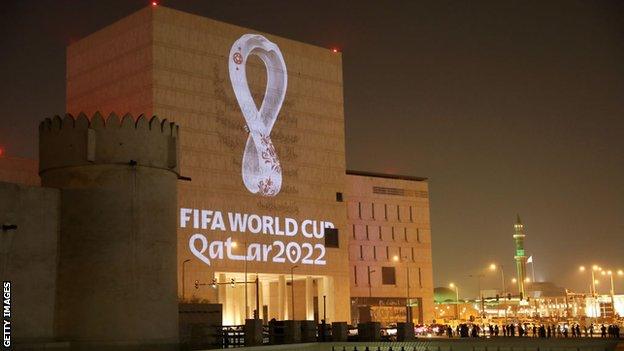2022 World Cup: Eight African nations forced to move ties
- Published

Five African nations will qualify for the 2022 World Cup in Qatar
Eight African countries have been stripped of home advantage in next month's World Cup qualifiers after their grounds were deemed unfit to host international matches and they will now have to play their home ties elsewhere.
Burkina Faso, the Central African Republic, Djibouti, Guinea Bissau, Malawi, Mali, Namibia and Niger have all had matches moved to neutral grounds at the start of the group phase of Africa's qualifiers for the next World Cup in Qatar.
Their venues failed inspections by a team from the Confederation of African Football (Caf).
The changes, confirmed in the list of fixtures issued by FIFA for next month's opening two rounds of group qualifiers, come after an extensive review last year of stadiums and playing surfaces across Africa.
Countries were warned to upgrade their facilities or risk being banned from hosting international matches.
The decision will come as a particular blow to Burkina Faso, who cede home advantage for what could be the key tie in Group A when they meet African champions Algeria on 6 September.
Instead of being played in Ouagadougou, the match has been moved to Marrakesh in Morocco, which will also host Niger's clash with Burkina Faso on 1 September.
Several other games will also be played in Morocco with Djibouti facing Niger in another Group A game in Rabat on 5 September while Mali, who are favourites in Group E, must host Rwanda in Agadir on 31 August according to Fifa schedule.
Mali built new stadiums to host the Africa Cup of Nations finals some 20 years ago, but none are now deemed suitable.
Namibia, who host Congo on 1 September in Group H, and Malawi, at home to Mozambique in Group D six days later, must play their games at the Orlando Stadium in Johannesburg.
Guinea Bissau's derby with neighbours Guinea in Group I has been moved in Nouakchott, Mauritania, despite a late inspection of facilities in Bissau where Caf found the playing surface, changing rooms and floodlights below international standards.
Countries banned from playing at home were allowed to negotiate their own alternatives, said Guinea Bissau Football Federation president Carlos Mendes Teixeira.
There are 40 teams competing in 10 African groups, with only the group winners to proceed to the home-and-away playoffs next March which will determine five African qualifiers for the finals in Qatar in late 2022.